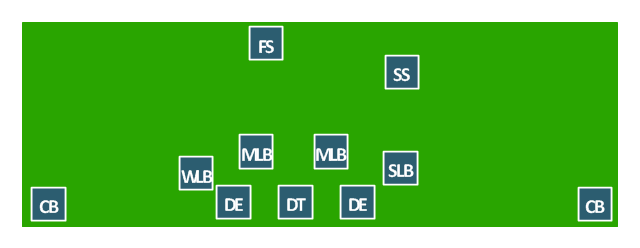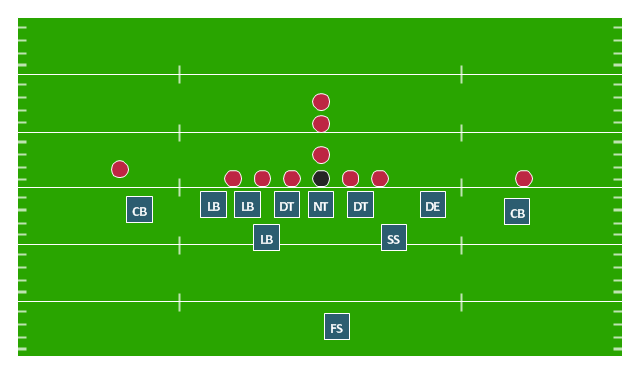"In American football, a 4–3 defense is a defensive alignment consisting of four down linemen and three linebackers. It is probably the most commonly used defense in modern American football and especially in the National Football League. ...
In the original version of the 4–3, the tackles lined up over the offensive guards and the ends lined up on the outside shoulder of the offensive tackles, with the middle linebacker over the center and the other linebackers outside the ends. In the mid-1960s Hank Stram developed a popular variation, the "Kansas City Stack", which shifted the strong side defensive end over the tight end, stacked the strongside linebacker over the tackle, and shifted the weakside tackle over center. At about the same time the Cleveland Browns frequently used a weakside shift. The Dallas Cowboys coach Tom Landry developed a "flex" variation, in order to take advantage of the quickness of his Hall of Fame tackle, Bob Lilly. In Tom Landry's original 4–3 defenses (4-3 Inside and 4-3 Outside), both defensive tackle were flexed. In the "flex", on a pro set right, with defensive keys showing a run to the right, the right defensive tackle would be flush on the line and was supposed to penetrate. The right defensive end and left defensive tackle were flexed two feet off the line of scrimmage, the right defensive end now head on with the left offensive tackle (i.e. a 4-2-2-5 front instead of the more common 5-2-2-5 front). This gave the defense a "zig zag" look unlike any other of its day. More modern versions of the 4-3 include the Tampa 2 scheme and the 4-3 slide." [4–3 defense. Wikipedia]
The American football positions diagram example "Defensive play - Under front" was created using the ConceptDraw PRO diagramming and vector drawing software extended with the Football solution from the Sport area of ConceptDraw Solution Park.
In the original version of the 4–3, the tackles lined up over the offensive guards and the ends lined up on the outside shoulder of the offensive tackles, with the middle linebacker over the center and the other linebackers outside the ends. In the mid-1960s Hank Stram developed a popular variation, the "Kansas City Stack", which shifted the strong side defensive end over the tight end, stacked the strongside linebacker over the tackle, and shifted the weakside tackle over center. At about the same time the Cleveland Browns frequently used a weakside shift. The Dallas Cowboys coach Tom Landry developed a "flex" variation, in order to take advantage of the quickness of his Hall of Fame tackle, Bob Lilly. In Tom Landry's original 4–3 defenses (4-3 Inside and 4-3 Outside), both defensive tackle were flexed. In the "flex", on a pro set right, with defensive keys showing a run to the right, the right defensive tackle would be flush on the line and was supposed to penetrate. The right defensive end and left defensive tackle were flexed two feet off the line of scrimmage, the right defensive end now head on with the left offensive tackle (i.e. a 4-2-2-5 front instead of the more common 5-2-2-5 front). This gave the defense a "zig zag" look unlike any other of its day. More modern versions of the 4-3 include the Tampa 2 scheme and the 4-3 slide." [4–3 defense. Wikipedia]
The American football positions diagram example "Defensive play - Under front" was created using the ConceptDraw PRO diagramming and vector drawing software extended with the Football solution from the Sport area of ConceptDraw Solution Park.
"In American football, the dime defense is a defensive alignment that uses six defensive backs. It is usually employed in obvious passing situations.
The formation usually consists of six defensive backs, usually two safeties and four cornerbacks, and has either four down linemen and one linebacker, or three down linemen and two linebackers. This formation is to prevent the offense from completing a medium to long range pass play. This may be because the offense's running game is inefficient, time is an issue, or they need a long pass for a first down. It is also used against teams whose pass to run ratio predominately favors pass . The formation, however, is vulnerable to running plays as the formation is missing two linebackers, or a linebacker and a down lineman. A dime defense differs from the nickel in that it adds a sixth defensive back to the secondary. This sixth defensive back is called a "dimeback" (D). The defense gets its name because a dime is the next step up in US coin currency from a nickel. There are also 'quarter" and "half-dollar" formations (each protecting against progressively deeper thrown and more likely pass attempts)." [Dime defense. Wikipedia]
The American football positions diagram example "Dime defense" was created using the ConceptDraw PRO diagramming and vector drawing software extended with the Football solution from the Sport area of ConceptDraw Solution Park.
The formation usually consists of six defensive backs, usually two safeties and four cornerbacks, and has either four down linemen and one linebacker, or three down linemen and two linebackers. This formation is to prevent the offense from completing a medium to long range pass play. This may be because the offense's running game is inefficient, time is an issue, or they need a long pass for a first down. It is also used against teams whose pass to run ratio predominately favors pass . The formation, however, is vulnerable to running plays as the formation is missing two linebackers, or a linebacker and a down lineman. A dime defense differs from the nickel in that it adds a sixth defensive back to the secondary. This sixth defensive back is called a "dimeback" (D). The defense gets its name because a dime is the next step up in US coin currency from a nickel. There are also 'quarter" and "half-dollar" formations (each protecting against progressively deeper thrown and more likely pass attempts)." [Dime defense. Wikipedia]
The American football positions diagram example "Dime defense" was created using the ConceptDraw PRO diagramming and vector drawing software extended with the Football solution from the Sport area of ConceptDraw Solution Park.
The vector stencils library "American football positions" contains 38 american football (gridiron) players symbols.
Use it for drawing diagrams of American football positions in the ConceptDraw PRO diagramming and vector drawing software extended with the Football solution from the Sport area of ConceptDraw Solution Park.
Use it for drawing diagrams of American football positions in the ConceptDraw PRO diagramming and vector drawing software extended with the Football solution from the Sport area of ConceptDraw Solution Park.
"This base defense consists of four defensive linemen, three linebackers, and four defensive backs (two safeties, two corners). Against two-receiver offensive sets, this formation is effective against the run and the pass. In the original 4–3, defensive tackles would line up opposite the offensive guards, and defensive ends on the outside shoulders of the offensive tackles. On passing downs, the Mike (middle linebacker) is often responsible to cover any running backs, the Sam (strong-side linebacker) covers the Tight End, and the Will (weak-side linebacker) either covers a back or blitzes in an attempt to sack the quarterback. Though first used as a base defense by the New York Giants in 1956, plenty of teams experimented with it during the 1950s, and thus there are multiple claimed inventors of this defense. There are several different variations of the 4–3 defense such as the 4-3 under defense, 4-3 over defense, 4-3 umbrella defense, 4-3 swim defense, and 4-3 slide defense." [List of formations in American football. Wikipedia]
This example diagram was redesigned from the Wikimedia Commons file: 4-3 green.svg.
[commons.wikimedia.org/ wiki/ File:4-3_ green.svg]
This file is licensed under the Creative Commons Attribution-Share Alike 3.0 Unported license. [creativecommons.org/ licenses/ by-sa/ 3.0/ deed.en]
The American football positions diagram example "Defensive Formation - 4-3 defense" was created using the ConceptDraw PRO diagramming and vector drawing software extended with the Football solution from the Sport area of ConceptDraw Solution Park.
This example diagram was redesigned from the Wikimedia Commons file: 4-3 green.svg.
[commons.wikimedia.org/ wiki/ File:4-3_ green.svg]
This file is licensed under the Creative Commons Attribution-Share Alike 3.0 Unported license. [creativecommons.org/ licenses/ by-sa/ 3.0/ deed.en]
The American football positions diagram example "Defensive Formation - 4-3 defense" was created using the ConceptDraw PRO diagramming and vector drawing software extended with the Football solution from the Sport area of ConceptDraw Solution Park.
Defensive Strategy Diagram – 46 Defence
Drawing defensive strategy diagrams using ConceptDraw PRO software extended with the Football solution saves your time, and adds more value to your work. You can easily convert vector drawing to a popular graphic format and then post it to your blog or site. There is no problem to add your logo or text copyright, or use some text comments to make your diagrams unique and recognizable."The goal line is the chalked or painted line dividing the end zone from the field of play in American football and Canadian football. It is the line that must be crossed in order to score a touchdown
If any part of the ball reaches any part of the imaginary vertical plane transected by this line while in-bounds and in possession of a player whose team is striving toward that end of the field, this is considered a touchdown and scores six points for the team whose player has advanced the ball to, or recovered the ball in, this position. This is in contrast with other sports like Association football and ice hockey, which require the puck or ball to pass completely over the goal line to count as a score.
If any member of the offensive team is downed while in possession of the ball behind his own team's goal line, this is called a safety and scores two points for the defensive team.
If, during the course of play, a loose ball travels past the goal line and is recovered within the end zone, then it is a touchdown if recovered by the kicking team, or a touchback if recovered and downed by the receiving team.
In the event of a kick recovered in one's own end zone, the entirety of the ball must pass the goal line in order for the ball to be considered in the field of play, and not a touchback." [Goal line (gridiron football). Wikipedia]
The American football positions diagram example "Goal line formation (Offense/ Defense)" was created using the ConceptDraw PRO diagramming and vector drawing software extended with the Football solution from the Sport area of ConceptDraw Solution Park.
If any part of the ball reaches any part of the imaginary vertical plane transected by this line while in-bounds and in possession of a player whose team is striving toward that end of the field, this is considered a touchdown and scores six points for the team whose player has advanced the ball to, or recovered the ball in, this position. This is in contrast with other sports like Association football and ice hockey, which require the puck or ball to pass completely over the goal line to count as a score.
If any member of the offensive team is downed while in possession of the ball behind his own team's goal line, this is called a safety and scores two points for the defensive team.
If, during the course of play, a loose ball travels past the goal line and is recovered within the end zone, then it is a touchdown if recovered by the kicking team, or a touchback if recovered and downed by the receiving team.
In the event of a kick recovered in one's own end zone, the entirety of the ball must pass the goal line in order for the ball to be considered in the field of play, and not a touchback." [Goal line (gridiron football). Wikipedia]
The American football positions diagram example "Goal line formation (Offense/ Defense)" was created using the ConceptDraw PRO diagramming and vector drawing software extended with the Football solution from the Sport area of ConceptDraw Solution Park.
"In American football, each team has eleven players on the field at one time. The specific role that a player takes on the field is called their position. Under the modern rules of American football, teams are allowed unlimited substitutions, that is teams may change any number of players after any play. This has resulted in the development of three "platoons" of players, the offense (the team with the ball, who is trying to score), the defense (the team trying to prevent the other team from scoring, and to take the ball from them), and the special teams (who play in kicking situations). Within those platoons, various specific positions exist depending on what the player's main job is." [American football positions. Wikipedia]
The American football positions diagram example "3-4 Defense" was created using the ConceptDraw PRO diagramming and vector drawing software extended with the Football solution from the Sport area of ConceptDraw Solution Park.
The American football positions diagram example "3-4 Defense" was created using the ConceptDraw PRO diagramming and vector drawing software extended with the Football solution from the Sport area of ConceptDraw Solution Park.
"The goal line is the chalked or painted line dividing the end zone from the field of play in American football and Canadian football. It is the line that must be crossed in order to score a touchdown
If any part of the ball reaches any part of the imaginary vertical plane transected by this line while in-bounds and in possession of a player whose team is striving toward that end of the field, this is considered a touchdown and scores six points for the team whose player has advanced the ball to, or recovered the ball in, this position. This is in contrast with other sports like Association football and ice hockey, which require the puck or ball to pass completely over the goal line to count as a score.
If any member of the offensive team is downed while in possession of the ball behind his own team's goal line, this is called a safety and scores two points for the defensive team.
If, during the course of play, a loose ball travels past the goal line and is recovered within the end zone, then it is a touchdown if recovered by the kicking team, or a touchback if recovered and downed by the receiving team.
In the event of a kick recovered in one's own end zone, the entirety of the ball must pass the goal line in order for the ball to be considered in the field of play, and not a touchback." [Goal line (gridiron football). Wikipedia]
The American football positions diagram example "Goal line formation (Offense/ Defense)" was created using the ConceptDraw PRO diagramming and vector drawing software extended with the Football solution from the Sport area of ConceptDraw Solution Park.
If any part of the ball reaches any part of the imaginary vertical plane transected by this line while in-bounds and in possession of a player whose team is striving toward that end of the field, this is considered a touchdown and scores six points for the team whose player has advanced the ball to, or recovered the ball in, this position. This is in contrast with other sports like Association football and ice hockey, which require the puck or ball to pass completely over the goal line to count as a score.
If any member of the offensive team is downed while in possession of the ball behind his own team's goal line, this is called a safety and scores two points for the defensive team.
If, during the course of play, a loose ball travels past the goal line and is recovered within the end zone, then it is a touchdown if recovered by the kicking team, or a touchback if recovered and downed by the receiving team.
In the event of a kick recovered in one's own end zone, the entirety of the ball must pass the goal line in order for the ball to be considered in the field of play, and not a touchback." [Goal line (gridiron football). Wikipedia]
The American football positions diagram example "Goal line formation (Offense/ Defense)" was created using the ConceptDraw PRO diagramming and vector drawing software extended with the Football solution from the Sport area of ConceptDraw Solution Park.
This sample shows 46 defensive formation (original 4-3 base set) developed and popularized by the Chicago Bears. You use this sample to explain positions, and then add additional content to explain the situation, adding arrows and text labels.
The American football positions diagram example "Defensive strategy - 46 defence" was created using the ConceptDraw PRO diagramming and vector drawing software extended with the Football solution from the Sport area of ConceptDraw Solution Park.
The American football positions diagram example "Defensive strategy - 46 defence" was created using the ConceptDraw PRO diagramming and vector drawing software extended with the Football solution from the Sport area of ConceptDraw Solution Park.
- Defensive Play Diagram – Under Front | Defensive play - Under front ...
- Defensive Strategy Diagram – 46 Defence | Defensive strategy - 46 ...
- 3-4 Defense Diagram
- Defensive play - Under front | Soccer (Football) Formation ...
- American football positions - Vector stencils library | American ...
- Defensive play - Under front | Inside Right Position Football Diagram
- Defensive Strategy Diagram – 46 Defence | Ice Hockey Diagram ...
- American football positions - Vector stencils library | Defensive play ...
- American football positions - Vector stencils library | Design ...
- (Football) Positions
- American football positions - Vector stencils library | Soccer (Football ...
- American football positions - Vector stencils library | Football ...
- American football positions - Vector stencils library | Design ...
- Football | Soccer (Football) Positions | American football positions ...
- Soccer (Football) Formation | Defensive Formation – 4-3 Defense ...
- Soccer (Football) Diagram Software | How to Make Soccer Position ...
- Soccer (Football) Positions | Association football (soccer) positions ...
- Wide area network (WAN) topology. Computer and Network ...
- Defensive Formation – 4-3 Defense Diagram | Defensive formation ...
- Swim Lane Diagrams | Swim Lanes Flowchart. Flowchart Examples ...
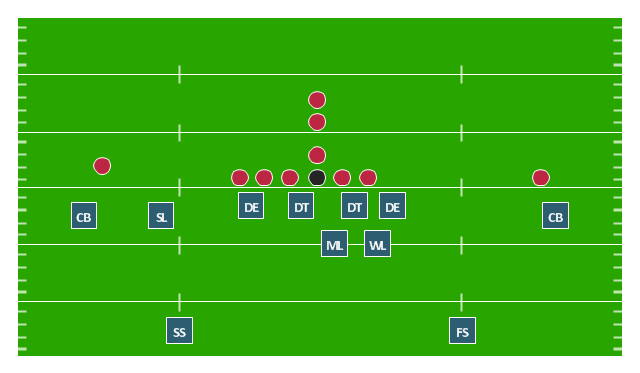
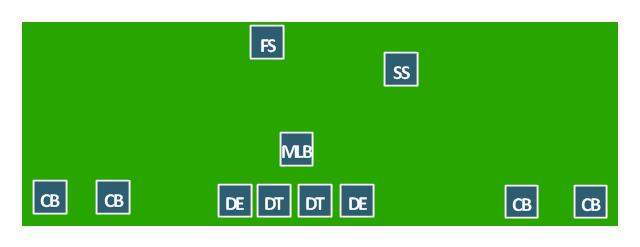
-american-football-positions---vector-stencils-library.png--diagram-flowchart-example.png)
-american-football-positions---vector-stencils-library.png--diagram-flowchart-example.png)
-american-football-positions---vector-stencils-library.png--diagram-flowchart-example.png)
-american-football-positions---vector-stencils-library.png--diagram-flowchart-example.png)
-american-football-positions---vector-stencils-library.png--diagram-flowchart-example.png)
-american-football-positions---vector-stencils-library.png--diagram-flowchart-example.png)
-american-football-positions---vector-stencils-library.png--diagram-flowchart-example.png)
-american-football-positions---vector-stencils-library.png--diagram-flowchart-example.png)
-american-football-positions---vector-stencils-library.png--diagram-flowchart-example.png)
-american-football-positions---vector-stencils-library.png--diagram-flowchart-example.png)
-american-football-positions---vector-stencils-library.png--diagram-flowchart-example.png)
-american-football-positions---vector-stencils-library.png--diagram-flowchart-example.png)
-american-football-positions---vector-stencils-library.png--diagram-flowchart-example.png)
-american-football-positions---vector-stencils-library.png--diagram-flowchart-example.png)
-american-football-positions---vector-stencils-library.png--diagram-flowchart-example.png)
-american-football-positions---vector-stencils-library.png--diagram-flowchart-example.png)
-american-football-positions---vector-stencils-library.png--diagram-flowchart-example.png)
-american-football-positions---vector-stencils-library.png--diagram-flowchart-example.png)
-american-football-positions---vector-stencils-library.png--diagram-flowchart-example.png)
-american-football-positions---vector-stencils-library.png--diagram-flowchart-example.png)
-american-football-positions---vector-stencils-library.png--diagram-flowchart-example.png)
-american-football-positions---vector-stencils-library.png--diagram-flowchart-example.png)
-american-football-positions---vector-stencils-library.png--diagram-flowchart-example.png)
-american-football-positions---vector-stencils-library.png--diagram-flowchart-example.png)
-american-football-positions---vector-stencils-library.png--diagram-flowchart-example.png)
-american-football-positions---vector-stencils-library.png--diagram-flowchart-example.png)
-american-football-positions---vector-stencils-library.png--diagram-flowchart-example.png)
-american-football-positions---vector-stencils-library.png--diagram-flowchart-example.png)
-american-football-positions---vector-stencils-library.png--diagram-flowchart-example.png)
-american-football-positions---vector-stencils-library.png--diagram-flowchart-example.png)
-american-football-positions---vector-stencils-library.png--diagram-flowchart-example.png)
-american-football-positions---vector-stencils-library.png--diagram-flowchart-example.png)
-american-football-positions---vector-stencils-library.png--diagram-flowchart-example.png)
-american-football-positions---vector-stencils-library.png--diagram-flowchart-example.png)
-american-football-positions---vector-stencils-library.png--diagram-flowchart-example.png)
-american-football-positions---vector-stencils-library.png--diagram-flowchart-example.png)
-american-football-positions---vector-stencils-library.png--diagram-flowchart-example.png)
-american-football-positions---vector-stencils-library.png--diagram-flowchart-example.png)
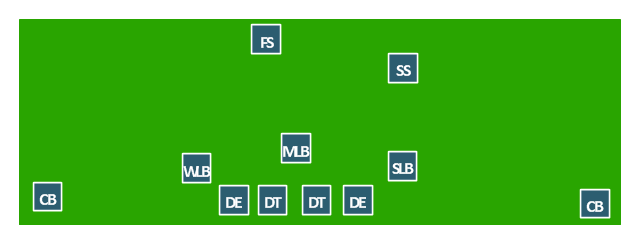
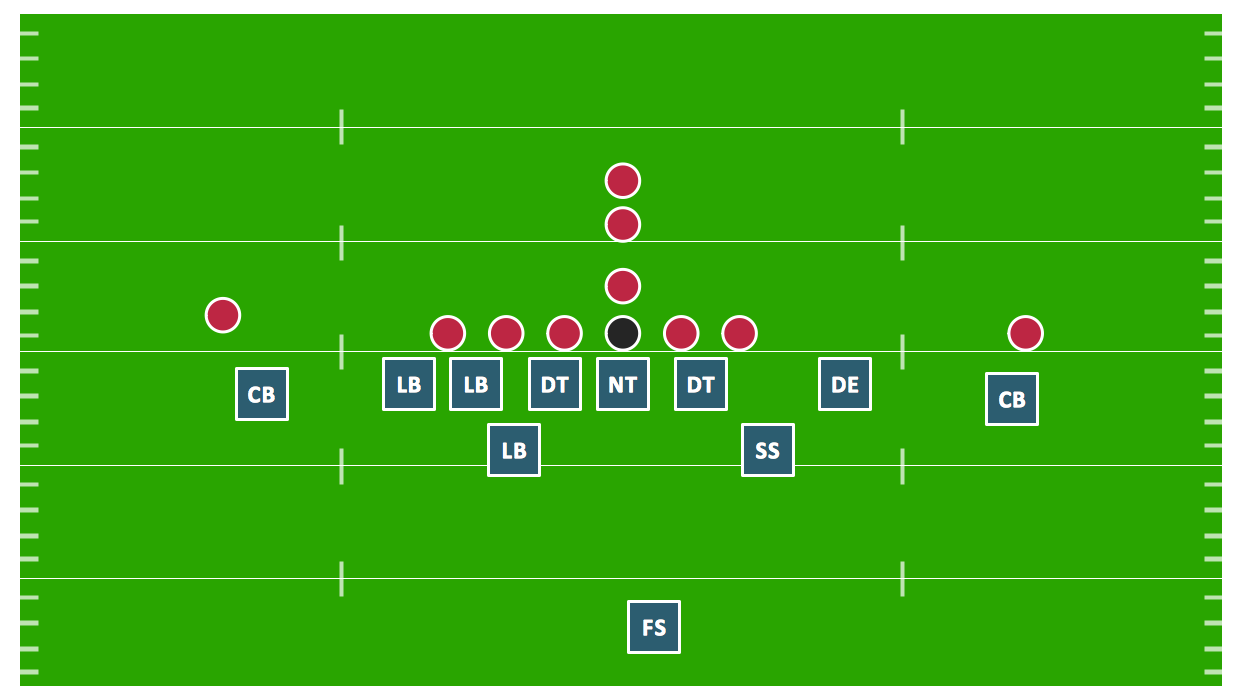
.png--diagram-flowchart-example.png)
